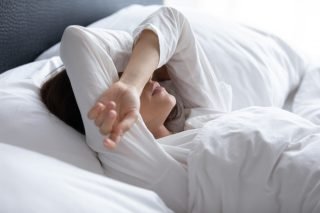Night owl? You aren’t alone. Mostly, we tend to hear stories of celebs being up and at it early. They seem to effortlessly get out of bed around 6 am and go about their day. If you, like me, are a fan of staying up late and indeed find that your best work and most creative time is in the middle of the night, fear not. It turns out that you aren’t alone, Madonna is with us. But is it bad for your health? Or are we all just built differently?
Madonna describes herself as a night owl
Madonna says that she is definitely not one of those celebs. The 63-year-old singer, who has six children, says that she is at her “most creative” at night and can stay up until 4 am. But how was this revealed? It doesn’t seem like something that might usually come out in an interview.
![Madonna [longevity live]](https://longevitylive.com/wp-content/uploads/2018/11/madonna-320x245.jpg) The singer was asked in a recent interview how she felt about doing an interview at 1 am and commented, “I’m good with it. I’m used to staying up late. I’m a night owl”. She also mentioned in her interview for Rolling Stone Magazine’s Musicians on Musicians series that she enjoys recording at night commenting “that’s when the juices start flowing”. In the same interview, the singer admitted that her bedtime was getting later and later, but is that a good thing or a bad thing?
The singer was asked in a recent interview how she felt about doing an interview at 1 am and commented, “I’m good with it. I’m used to staying up late. I’m a night owl”. She also mentioned in her interview for Rolling Stone Magazine’s Musicians on Musicians series that she enjoys recording at night commenting “that’s when the juices start flowing”. In the same interview, the singer admitted that her bedtime was getting later and later, but is that a good thing or a bad thing?
It’s actually in your DNA
According to an article written by Dr. Kroes on the Peninsula Doctor, there is a difference in brain chemistry. Whether you are an early riser or a night owl, it seems to be determined by your DNA. Genetically, it seems that some of us are simply predisposed to either waking with the sun or staying up into the early hours of the morning.
What is important to remember is that either way, you need to get enough sleep. The other important thing is the quality of sleep. It doesn’t matter when you sleep, only that it’s for long enough and that the sleep is of high quality. That is what allows you to be your most productive after you’ve woken up. Night owls make up only 20 percent of the population. So, even though you may feel like it, you aren’t alone.
Do night owls actually have a higher IQ?
Dr. Kroes mentions that, as far as evolution goes, humans have tended towards going to sleep and waking up according to the sun. So, when the sun goes down, it signals that it’s time to sleep and when it rises again, it’s time to get up and get on with your day. This is referred to as the circadian rhythm.
![worry sleep [longevity live]](https://longevitylive.com/wp-content/uploads/2019/04/adult-asleep-bed-935777-320x213.jpg)
The majority of humans tend to follow this circadian rhythm, but it’s the deviation from a traditional way of thinking that signals this higher IQ. It seems that many scientists and sleep specialists view this deviation as a form of evolution. Generally, people with divergent circadian cycles are, according to the article by Dr. Kroes, considered more intelligent.
Late-night owls seem to experience less stress
The earlier we wake up, the higher the levels of the stress hormone cortisol seem to be. People who wake up before half-past 7 in the morning not only wake up with higher levels of cortisol, it continues throughout the day. A study on early risers also found that they were “more likely to suffer from muscle aches, headaches, and cold symptoms“. They also seemed to have a shorter fuse and were, in general, angrier throughout the day than those who woke later.
There are some issues when it comes to being a night owl
According to Keck Medicine of USC, being a night owl can have some fairly severe consequences health-wise. A few recent studies have shown that regardless of lifestyle, night owls tend to have “higher levels of body fat and an increased risk of developing other health problems”.

fizkes/shutterstock
It can also make for poor sleep quality if you aren’t careful. Another issue is that staying up into the wee hours often leads to unhealthy habits such as drinking alcohol late at night and snacking. Night owls also seem to be at a higher risk of developing depression.
Insufficient sleep is a huge problem
Perhaps the most important issue though is culture. Mostly, our culture favors the early risers and schedules work and school around getting up early. This means that, often, people who work best at night simply aren’t getting enough sleep. Mostly, we have to adhere to company culture and, because 80% of the population are early risers, society tends towards favoring them.
If you aren’t getting enough sleep on a regular basis, as is the case with many night owls, it puts your mind and body under major strain. Chronic insufficient sleep is linked to cardiovascular disease and even to poor mental health. Mostly, it’s best to adjust your sleep schedule, if only for the sake of your health.
If you struggle, Raj Dasgupta, MD, an assistant professor of clinical medicine at the Keck School of Medicine at USC and a pulmonary, critical care, and sleep medicine specialist at Keck Medicine at USC recommends melatonin. Dasgupta recommends you take two hours before your desired sleep time.
References
https://www.peninsuladoctor.com/blog/night-owls-are-smarter-more-creative-have-higher-iqs/
https://www.keckmedicine.org/does-being-a-night-owl-affect-your-health/





![women [longevity live]](https://longevitylive.com/wp-content/uploads/2020/01/photo-of-women-walking-down-the-street-1116984-100x100.jpg)










